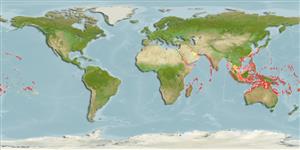>
Acanthuriformes (Surgeonfishes) >
Acanthuridae (Surgeonfishes, tangs, unicornfishes) > Acanthurinae
Etymology: Zebrasoma: Derived from Zebra = African horse + Greek, soma = body; referring to the stripes (Ref. 45335).
More on author: Bloch.
Environment: milieu / climate zone / depth range / distribution range
Ecologia
marinhas associadas(os) a recifes; intervalo de profundidade 0 - 45 m (Ref. 90102), usually 2 - 30 m (Ref. 27115). Tropical; 24°C - 28°C (Ref. 27115); 36°N - 25°S, 33°E - 134°W
Eastern Indian Ocean to the Pacific Ocean: Christmas Island and most of the East Indian region to South China Sea, Hawaii and Pitcairn Islands; north to Japan and Ogasawara Islands; south to western and eastern Australia; Replaced by Zebrasoma desjardinii in the Indian Ocean.
Tamanho / Peso / Idade
Maturity: Lm ? range ? - ? cm
Max length : 40.0 cm SL macho/indeterminado; (Ref. 9710)
Espinhos dorsais (total) : 4 - 5; Raios dorsais (total) : 29 - 33; Espinhos anais: 3; Raios anais : 23 - 26. Smalls juveniles have alternating yellow and black bars. No brush-like patch of setae posteriorly on side of body. Dorsal fin very elevated, the longest ray 2.1 to 2.5 times in SL (Ref 9808).
Benthopelagic (Ref. 58302). Occurs in lagoon and seaward reefs from the lower surge zone to a depth of at least 30 m. Solitary juveniles found among rocks or coral (Ref. 58534) of shallow protected, sometimes turbid reefs (Ref. 1602, 48637). Feeds on leafy macroalgae. It possesses, fewer and larger pharyngeal teeth, compared to the other Zebrasoma spp. (Ref. 33204). Diurnal species (Ref. 113699:32); courtship and spawning takes place from morning to afternoon and is often confined to ebb tides (Ref. 38697). The species is never poisonous (Ref. 4795). Minimum depth reported taken from Ref. 128797.
Ciclo de vida ou comportamento de acasalamento
Maturities | Reprodução | Spawnings | Egg(s) | Fecundities | Larvas
Paired spawning (Ref. 240).
Myers, R.F., 1999. Micronesian reef fishes: a comprehensive guide to the coral reef fishes of Micronesia, 3rd revised and expanded edition. Coral Graphics, Barrigada, Guam. 330 p. (Ref. 37816)
Status na Lista Vermelha da UICN (Ref. 130435)
Ameaça para os humanos
Harmless
Uso pelos humanos
Pescarias: pouco comercial; Aquário: Espécies comerciais
Ferramentas
Relatórios especiais
Baixar XML
Fontes da internet
Estimates based on models
Preferred temperature (Ref.
123201): 24.8 - 28.9, mean 27.6 °C (based on 874 cells).
Índice de diversidade filogenética (Ref.
82804): PD
50 = 0.5078 [Uniqueness, from 0.5 = low to 2.0 = high].
Bayesian length-weight: a=0.02399 (0.01460 - 0.03941), b=2.93 (2.79 - 3.07), in cm total length, based on LWR estimates for this species & (Sub)family-body (Ref.
93245).
Nível Trófico (Ref.
69278): 2.0 ±0.00 se; based on food items.
Generation time: 3.9 ( na - na) years. Estimated as median ln(3)/K based on 1
growth studies.
Resiliência (Ref.
120179): médio(a), tempo mínimo de duplicação da população 1,4 - 4,4 anos (K=0.282; Tmax=27).
Fishing Vulnerability (Ref.
59153): Moderate vulnerability (37 of 100).
Nutrients (Ref.
124155): Calcium = 30.7 [14.1, 91.0] mg/100g; Iron = 0.723 [0.256, 1.679] mg/100g; Protein = 18.1 [16.8, 19.4] %; Omega3 = 0.131 [0.063, 0.270] g/100g; Selenium = 14.2 [5.0, 55.8] μg/100g; VitaminA = 42.1 [9.4, 172.9] μg/100g; Zinc = 1.83 [0.83, 3.21] mg/100g (wet weight);
